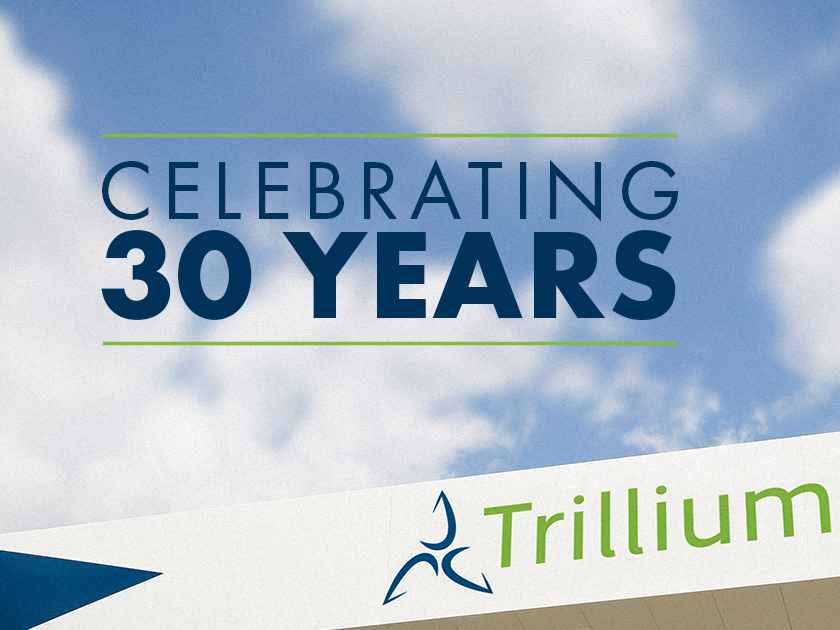Powering greener future
Trillium celebrates 30 years of being one partner for any alternative fuel
In 2016, Love’s Founder Tom Love made the decision to acquire an alternative fuels company and make it a member of the Love’s Family of Companies. Tom knew innovation would be what sustained the company he founded and would carry it into the future. And he was correct. This year, Trillium Energy Solutions celebrates 30 years and proudly reflects on three decades of success with a bright future.
“It is an exciting time in the renewable and alternate fuels industry, and even more exciting for us here at Trillium,” said Ryan Erickson, vice president of Trillium. “The growth over the last three decades is attributed not only to our talented and industrious team members, but also to the loyal customers who share in the same environmental goals.”
A storied past
Founded in 1994, Trillium actually began north of the border in Canada when Union Gas and Westcoast Energy combined to become the largest natural gas distributor in Canada. Trillium USA was established not long afterward in the U.S. with operations headquartered in Salt Lake City, Utah. Keeping a piece of their Canadian roots, the company was named after the official flower and emblem of Ontario – the white trillium. The large, three-petal flower also resembled a gas flame, and it remains part of the logo today.
In the early days, Trillium projects mostly involved designing, building and operating a network of compressed natural gas (CNG) fueling stations for Fortune 500 companies’ trucking fleets and public entities, with LA Metro, the transit agency in California, being one of the first big customers. Trillium also developed it’s 20 plus year relationship fueling all New York City Transit’s CNG buses, built and still operates the three largest CNG stations in the country for San Antonia VIA transit, and two transit depots for Las Vegas RTCs’. In addition, Trillium built the first U.S. CNG station for an international airport in Miami, plus built and operated four stations for UPS and 16 fueling stations for Frito Lay. Trillium has consistently been the second largest distributor of CNG in the country delivering more than 80 million gallons each year.
Over those first 20 years, Trillium had several different owner groups but Carson Hoyt, general manager of construction and maintenance was here for almost all of it. “In my 26 years with Trillium, CNG facilities are where we really took off in the alternative fuels space,” Hoyt explained. “We’ve built around 300 CNG stations in our history and still operate over 200 of those stations today, with more than 60 locations being Trillium or Love’s public-access CNG facilities.”
At the time of acquisition in 2016, Trillium secured two of the biggest deals in the history of CNG fueling in the U.S. Trillium held deals to build and operate at least three large CNG stations for all of Miami-Dade County’s bus fleet valued at over $60 million, and with the Pennsylvania DOT to build and operate over 20 CNG stations for many of the transit agencies throughout the entire Commonwealth valued at close to $90 million. Trillium continues to build out these CNG stations to this day.
Foundations built
Thanks to the Love’s acquisition, Trillium began to dramatically grow its business around renewable natural gas (RNG). Today Trillium dispenses 40 million gallons of RNG per year in place of fossil natural gas from dairies, landfills and wastewater treatment plants. This includes RNG from the Southern California Point Loma Wastewater Treatment Plant Trillium owns and has operated for the last 5 years. In many cases, Trillium can completely eliminate its customers greenhouse gas emissions from their heavy-duty vehicle operations.
The next pivotal milestone came in 2020 when Trillium completed the build of one of the first and largest hydrogen fueling stations in the U.S. for heavy-duty vehicles at the Orange County Transportation Authority in Southern California. According to Erickson, this was just the beginning. “Trillium immediately proved to our customers and the industry that we are the premiere choice to assist transit fleets in reducing costs and improving performance when switching to zero-emission buses. Today, we have contracts to operate five hydrogen stations and are being selected to provide new hydrogen stations for over half of the heavy duty transit market. “
A bright future
As Trillium eyes the next decade, it’s going to be an exciting time in the alternative fuels industry. The company spent 2023 developing and continues to build out Love’s electric vehicle (EV) charging footprint across the U.S. by securing millions of dollars of grants. With the installations of new fast-charging EV chargers at existing travel stops, it expects to add multiple fast-chargers at close to 100 Love’s locations in the next few years. The company is also adding several new public retail RNG stations in California, Oklahoma and other states. In the hydrogen space, Trillium is looking to expand its hydrogen fueling expertise into the trucking market.
